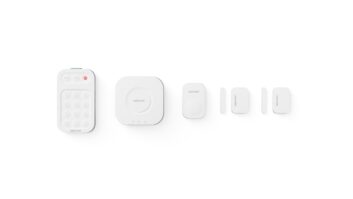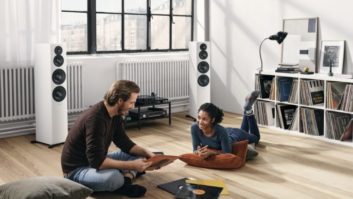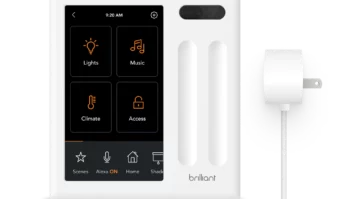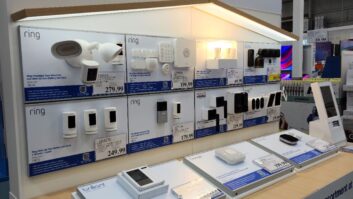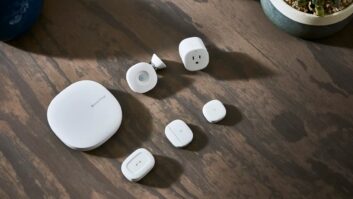Custom installers think they’re the brand, but they can’t match the brand awareness of Verizon Communications, the telecom carrier with more landline- and wireless-phone subscribers than any of its competitors.
Through its subsidiary, Verizon Connected Solutions (VCS), the company is making a play for the residential custom-installation business, having begun in 1999 to design and install structured-wiring systems and basic architectural speaker systems for home builders.
This year, as the only U.S. phone company that’s ventured into the custom market, VCS and its roughly 1,300 technicians will wire up 20,000 households, including single-family homes and multiple dwelling units, with Verizon-branded equipment, said Jim Kenny, VCS’s general manager of marketing and new market development.
In the future, VCS plans to offer more sophisticated distributed-audio systems and diversify into A/V electronics, lighting, security and motorized shade and drapery systems. VCS also plans to expand into new geographic markets.
Whereas its sister companies offer landline phone service in 28 states and wireless-phone service in 49 states, the VCS subsidiary offers installation service in only a handful of states. Having started out in Maryland, Virginia and Washington, D.C. in 1999, the company has expanded into New Jersey, New York and New England. In 2003, the company wants to enter Pennsylvania and increase its reach in the New Jersey and New England markets, said Kenny.
“Our long-term goal is to have VCS in all markets [where Verizon offers local phone service] if there is demand,” Kenny said.
In the meantime, VCS wants to expand its physical presence. The company operates showrooms in Chantilly, Va., and Rosedale, Md., and wants to add more in other markets, perhaps in Verizon-owned wireless-phone stores.
To expand its product selection, the company “is in active discussions with CE partners to create a more complete solution for audio by offering electronics and sources,” Kenny said. The additional products could be inventoried in warehouses operated in most states by sister company Verizon Logistics.
VCS will only go so far on its own, however. “We’re looking at the mass market for this,” Kenny said. “We don’t see getting into real high-end products.” For higher end products, VCS could partner with retailers, and it’s already in a trial with a Virginia retailer. Verizon refers consumers to the dealer for equipment, and Verizon coordinates the installation, he said.
Conceivably, VCS could do just about anything it wants in the future, given the parent company’s $67 billion in 2001 revenues. VCS can also leverage one of the most extensive direct-mail lists in the nation: the one-third of the nation’s households that get monthly bills from Verizon for local-phone service. That’s not to mention the wireless subsidiary’s 30 million wireless subscribers in the U.S.Evolution: Although VCS is mapping an expansive future, its beginnings were humble. VCS started out in 1995 as a subsidiary of Bell Atlantic, the regional phone company that merged with GTE, another regional phone company, in mid-2000 to form Verizon Communications. Bell Atlantic created the subsidiary to more cost effectively compete with the electricians and other tradespeople who were allowed under deregulation to install phone wiring in homes and businesses. Previously, inside wiring was done by Verizon technicians who also maintained the company’s utility-pole cables and ran wires from the poles to homes.
Most of VCS’s initial business was direct to consumers or business, not to builders. For a while, VCS also installed satellite-TV systems for sister subsidiary Bell Atlantic Video, which no longer exists.
Then came what Kenny called the “convergence of video and telephony,” and the company in 1999 added products and services for data, video and audio, including DSL gateways, home LANs, cable-TV distribution, intercoms and security cameras.
Most of the demand has been from home builders and developers “who have listened to their customers,” Kenny said, but VCS also does some retrofit business.
For both markets, Verizon’s structured-wiring solution is built around Verizon-branded structured wiring hubs, most of them made by US Tec. The hub provides regulated, surge-protected power over connected wires that distribute voice, data, cable and satellite TV, and internet access throughout the house.
The wires terminate at Verizon-branded wallplates, which feature four modular ports that can be swapped out to offer any combination of services to a room. A wall plate could include a voice line, DSL connection, cable- or satellite-TV jack and a peripherals-sharing Ethernet connection. VCS doesn’t sell satellite dishes or receivers, however.
In audio, VCS offers a basic four-room in-wall speaker system, each speaker pair connected to an in-wall volume-control knob and to in-wall speaker inputs. The company also offers a three-room indoor system paired with an outdoor speaker pair. An in-wall five-speaker system for home theater rounds out the audio choices.
By the end of the year, VCS will offer a step-up home-network option that will add home-network software directly to the hub. Currently, networking software has to be installed on a user’s PC.
A wireless Wi-Fi [802.11b] option might also be available by year’s end to let users roam throughout the house with a Wi-Fi-equipped laptop or PDA.
Also in audio, VCS offers a Verizon-branded room-to-room in-wall intercom system that also incorporates AM/FM tuner, six-disc changer and two speakers.
As part of its diversification effort, VCS is “close to finalizing an agreement with a major security supplier,” and “very soon” it will reach agreements with CE suppliers to offer the electronics needed to offer complete distributed-audio and home theater solutions, Kenny said. VCS is also in discussions with a lighting provider.
Although VCS plans to offer most, if not all, of the components that typically define an electronic house, the company has no plans to enter the systems-integration market, at least for now, Kenny said. “At this point, you won’t see all controls in one keypad in each room from us. I don’t know if that’s reliable enough for the mass market, but it holds great promise.”
“If we’re going to put the Verizon name on it,” he said, “we want high reliability.”




